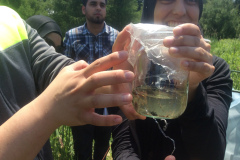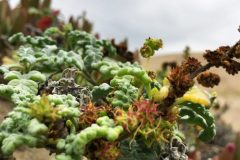Course Description
The Biology Field Course (BIOL4001) is a required component of York’s Environmental Biology degree and the Environmental Science (Honours Biodiversity and Conservation Stream) degree. It is also open to students registered in other York Biology degrees. Field courses are an integral part of undergraduate training in ecology and conservation. Students often report that the field course they take is the most enjoyable and enriching part of their degree, since they are immersed in an outdoor environment where they learn hands-on skills working with living organisms. Many students use the experience gained in field courses to obtain jobs as field workers and technicians, and to develop ideas for a 4th year research thesis or graduate work in field biology.
Students have access to a variety of field courses that vary in terms of budget, calendar, personal situation, and interest. The Department of Biology annually offers Urban Watershed Management and Biodiversity, restricted to York students. In addition, York’s Department of Biology is a long-time member of the 17-university Ontario Universities Program in Field Biology (OUPFB). These universities coordinate and pool their field courses, which means that York students have access to a great diversity of options over the duration of the field course season (late April to early September, with an occasional offering in Fall or Winter).
Urban Watershed Management and Biodiversity (Category A) is typically offered in the S1 term.
Applications are currently not open and will open Tuesday January 28th to Thursday January 30th.
The OUPFB courses (Category B) are in-person offerings that are mostly residential (i.e. students stay overnight), usually situated at locations remote from York and from the home university, and some of these include international sites. They run for two weeks straight including over the middle weekend. Students travel to field settings (often a research facility) to acquire skills in field methods, collecting and analyzing field data, the conducting of field experiments, as well as learning about the natural history and ecology of the local environment.
Applications are currently not open and will open Tuesday January 28th to Thursday January 30th.
There is a third category (Category C); please see below.
See article in YFile.
BIOL 400X: Regardless of the category (A, B, or C), the first field course on your York transcript will be assigned SC/BIOL 4001 3.00, the second will be assigned SC/BIOL 4002 3.00, and the third will be SC/BIOL 4003 3.00. (Any reference to BIOL 3001 3.00 should be read as BIOL 4001 3.00, since the 3rd year version has been retired).
Applying: Applications are currently not open and will open Tuesday January 28th to Thursday January 30th. You will use a online application MachForm for field courses in Category A or B.
Securing your place with a deposit:
There is no fee for the Category A field course other than tuition, but we invite you to apply on the MachForm so that we can assess the demand.
For OUPFB courses, upon applying for a module to reserve your spot, please bring in a $350 deposit to the Undergraduate Biology office in Life Sciences Building room 102. We cannot accept digital payments for the deposit, so it must be a cheque or cash. This deposit is partial payment of the course fee. We will review the applications, and we will only review those for which the deposit has been received.




